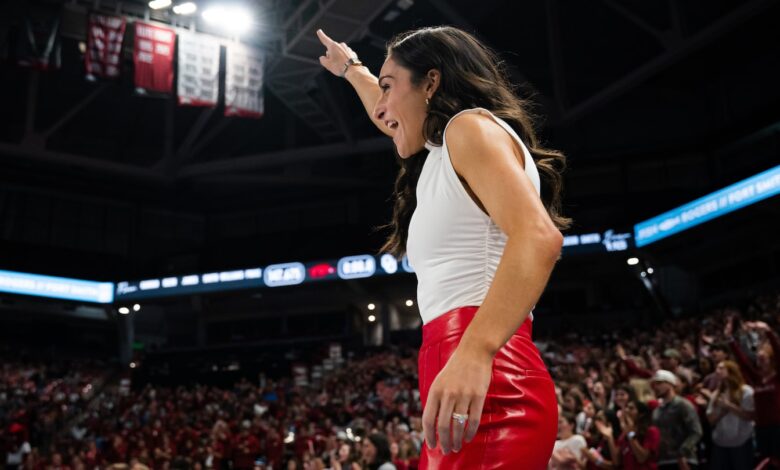How former Olympics star Jordyn Wieber put Arkansas gymnastics on the map

Wieber had won the world all-around title in 2011 and then an Olympic gold medal at the 2012 London Games. She had never led a team but had spent months crafting a plan — for recruiting, a budget and everything she dreamed her program could be. Yurachek thought the coffee-shop meeting would last an hour; he left three hours later, wondering if he had found his new gymnastics coach.
Even after Wieber impressed in formal interviews, Yurachek didn’t know if he could offer the job to someone so young. When he expressed that hesitation to UCLA’s then-coach, Valorie Kondos Field, she told him, “If you don’t hire her, somebody else will, and she will kick your a–.”
So Yurachek made the unorthodox hire, a gamble he said he probably couldn’t take in football or men’s basketball. Five years later, Arkansas is having one of its best seasons ever.
After finishing the regular season in 12th place nationally, the Razorbacks upset Kentucky to become one of eight teams to advance to Thursday’s NCAA semifinals, guaranteed to have at least the third-best finish in school history. As women’s college gymnastics booms nationwide, attendance at Razorbacks home meets has doubled to about 7,000 per meet, with some competitions held at Bud Walton Arena, the school’s basketball venue. After a renovation, the arena will soon be the full-time home venue for Wieber’s program.
During a retreat in August, sophomore Lauren Williams said the team set a vague but ambitious goal for the season: “We wanted to be ‘the team that did that,’ ” whatever achievements “that” ended up being.
Now the Razorbacks are: the first team to reach the NCAA semifinals under Wieber and the first at Arkansas to eclipse a team score of 198, a benchmark that only the best programs can reach. The top four scores in Arkansas history have come this season.
“To know we’re one of the top eight schools in NCAA gymnastics, that’s a really big deal,” Williams said. “That’s where you want to end up. We’re there.”
A teenager when she burst onto the world’s stage, Wieber faced a choice today’s athletes don’t: Compete in college or capitalize on your fame. She chose the latter, appearing in commercials, speaking at events and traveling the country on a post-Olympics tour.
Still, she desperately wanted to be part of a team, so she enrolled at UCLA. The only position Kondos Field could offer was team manager. So the Olympic champion spent three years helping the Bruins through tasks such as picking up meals, setting up equipment and vacuuming chalk from the bars area.
She became an assistant during her senior year. She didn’t have aspirations of becoming a head coach, she said; she had spent her childhood in a gym and didn’t want to spend her adulthood there, too. But as an assistant, Wieber realized how much of college coaching is about managing people and personalities, strategizing about marketing and embracing all of the other CEO-like responsibilities.
She also could coach, commanding respect and earning trust even as a 21-year-old. Kondos Field said she pulled from her experiences — positive and negative. Wieber is a survivor of Larry Nassar’s sexual abuse, and her longtime club coach John Geddert, a friend of the former national team doctor, was accused of enabling Nassar’s crimes and abusing gymnasts himself. Geddert died by suicide in 2021 as he faced criminal charges.
At UCLA, Wieber joined a program that she says was rooted in joy.
“She’s lived how a coach can empower you to be more than you ever thought you could be,” Kondos Field said. “And she’s lived when a coach tears your dreams down and stifles you.”
Wieber led UCLA’s floor team to No. 1 rankings in 2018 and 2019. And before UCLA’s gymnasts competed, Kondos Field noticed how they would look to Wieber for comfort and guidance.
“She is such a powerful person, in terms of how she carries herself,” said Felicia Hano, who was a gymnast at UCLA while Wieber coached there, then worked as an assistant at Arkansas in 2021 and 2022. “It can be pretty nerve-racking. She definitely makes you feel empowered when you’re about to step out onto the floor.”
When Wieber met with Yurachek in the coffee shop, she admitted she didn’t know exactly how to be a head coach. But she never let insecurity keep her from asking questions, and Yurachek noticed how she sought the opinions of others — and still does — when approaching big decisions.
Wieber knew her name would generate buzz at Arkansas, but that alone doesn’t sustain interest year after year. Leaning on her experience at UCLA, Wieber worked on perfecting all aspects of home meets that turn the event into a show, including athlete introductions, lighting and the layout of the equipment.
“All the little things matter to me,” said Wieber, now 28.
Her name matters, too, especially in recruiting. Williams grew up 25 minutes from the Arkansas campus, but she initially wanted to go farther from home for college. That changed when the Razorbacks hired Wieber, whose image once hung above Williams’s childhood bed.
Arkansas commit Joscelyn Roberson, a member of last year’s U.S. world championships team, said Wieber is one of her favorite gymnasts. Arkansas’ 2025 recruiting class is considered one of the best in the country.
Wieber loves how multifaceted her job is — she has everyone do an Enneagram test so they understand one another’s personalities — but her favorite time of day is still practice. Her gymnasts describe her as technical and detail-focused. She cares that Maddie Jones’s feet are side by side, rather than slightly crossed, as she twists through the air; she cares where gymnasts’ eyes are focused as they work through their floor routines.
Jones, a junior, initially committed to Rutgers and had a scholarship offer. But she had attended a summer camp at Arkansas and decided to walk on there instead. Since arriving on campus, Jones learned a new skill on floor and changed her beam dismount to one she had never mastered. Now she’s in the lineup on three apparatuses.
Wieber wants her program to combine grittiness and joy. Each year, she has felt as though she has been “chipping away at different pieces of our culture.” With its performance this season, the team kept setting school records on the way to the key breakthrough at the NCAA regionals.
Heading into the final event — floor, Arkansas’ best apparatus and Wieber’s specialty as a coach — the Razorbacks held a 0.15-point lead over Kentucky for second place, the finish needed to advance. Wieber said she “very secretly” watched the scoreboard and knew the Razorbacks were holding on to the edge as the rotation progressed.
By the time Williams competed as the fifth of six gymnasts, she needed only to avoid a major error. After delivering a solid routine, she leaped into Wieber’s arms. Williams didn’t know the precise score she needed, but she could tell from her coach’s tone that she had done enough. With the NCAA semifinal berth clinched, the celebration began.
“It wasn’t just a few tears,” Williams said. “We were ugly crying.”
That night, Wieber showed rare emotion, with tears welling up in her piercing brown eyes. Her mentor, Kondos Field, sobbed. And her boss, Yurachek, admitted a week later that when it comes to Wieber’s capabilities as a collegiate head coach, “The secret’s out.”




